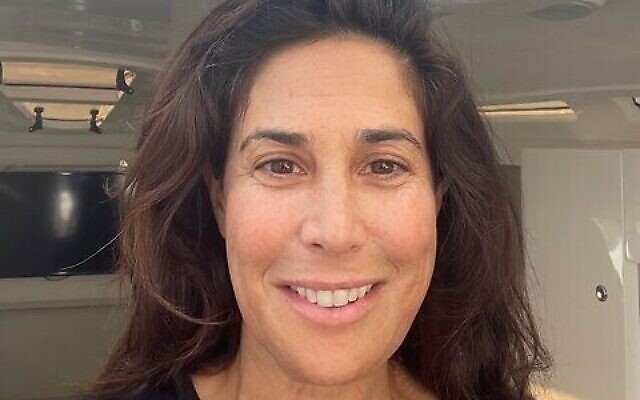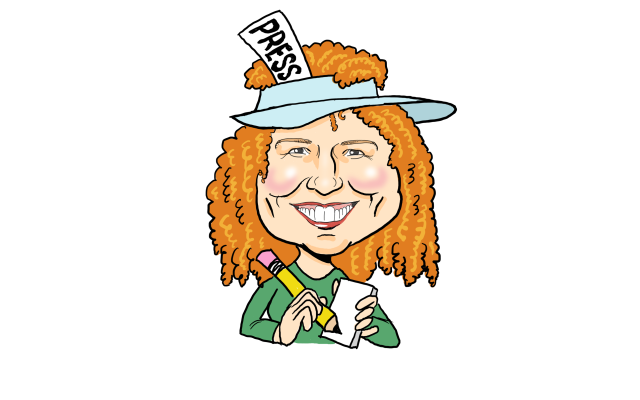Are You an Optimist?
Four Atlantans talk about the origins, goals and results of their decisions to be upbeat.
Chana Shapiro is an educator, writer, editor and illustrator whose work has appeared in journals, newspapers and magazines. She is a regular contributor to the AJT.
Four Atlantans talk about the origins, goals and results of their decisions to be upbeat.
Shirley Brickman, partner in Team Brickman.

I am an optimist. From the time I was a little girl, my precious Momma, of blessed memory, often said, “People will like you more if you always greet them with a smile. No one likes a kvetch (complainer).” That was a good lesson, and you know what? Momma was right.
My husband, Perry, and my children are optimists or very good actors. “Everything Is Gonna Be Alright” is our theme song. We feel darn lucky to have each other and are happy for each day. In life, there are gonna be bumps in the road. We don’t live in La-La Land. With help from Upstairs and a positive attitude, we have to do the best we can. Ain’t easy. My adorable Daddy, of blessed memory, had a cute sense of humor. Many times, he reminded me, when someone asks “you how’re you doing?” just smile and say, “Vunderfu!” (My European parents usually pronounced the letter “w” as a “v”).
Now, when I meet someone and am asked how I’m doing, I have a choice. I can either give them copies of my Xrays and MRI reports or I can smile and say, “Vunderful. Good to see you.” If I have unlimited time, I can ask, “And, how’re y’all doing?”
Jonathan Levin, retired software developer and business analyst.
 You dare ask a curmudgeon if he is an optimist? Amid the horrible state of the country and the world, pandemics, murders, anti-Semitism, racial strife, and total disregard for objective truths, how should I respond? I think that despite all that, there is opportunity for optimism. I was guided by a Pollyanna of a mother whose stories never saw a villain or serious difficulty, and a Great Depression-influenced father. Both gained strength through doing whatever was needed and smiling through it. They were no-nonsense educators who were always short on money, but who valued taking their boys on family road trips over cleaning the house or buying niceties.
You dare ask a curmudgeon if he is an optimist? Amid the horrible state of the country and the world, pandemics, murders, anti-Semitism, racial strife, and total disregard for objective truths, how should I respond? I think that despite all that, there is opportunity for optimism. I was guided by a Pollyanna of a mother whose stories never saw a villain or serious difficulty, and a Great Depression-influenced father. Both gained strength through doing whatever was needed and smiling through it. They were no-nonsense educators who were always short on money, but who valued taking their boys on family road trips over cleaning the house or buying niceties.
I have faced many disappointments, trials and scares, including orders for infantry in Vietnam (changed at the last minute), downsizing after 20 years of work at 57 (hired for 12 years elsewhere), and requiring a kidney transplant (bless my local donor). In every case, I and my optimism were restored. If I believed that the world depended only upon humankind, I would be pessimistic. Five years with a new kidney, though, teaches me that every day is a blessing from Hashem and an opportunity to improve myself and the world.
Michele Hirsch, parent and volunteer.
 I try to look forward to life with an optimistic approach. Optimism isn’t just a state of mind, it’s a daily conscious decision. My family and I have a motto: BOTO, meaning “Be Open To Outcome,” because no matter what we plan for, things can — and often will! — change. We look forward to the meaningful events in life, the bar and bat mitzvahs, the weddings, the sleepaway camps, but we are prepared to take things in stride. Life has a way of throwing things at us that we aren’t thrilled about, like, say, a global pandemic, and we can’t control that.
I try to look forward to life with an optimistic approach. Optimism isn’t just a state of mind, it’s a daily conscious decision. My family and I have a motto: BOTO, meaning “Be Open To Outcome,” because no matter what we plan for, things can — and often will! — change. We look forward to the meaningful events in life, the bar and bat mitzvahs, the weddings, the sleepaway camps, but we are prepared to take things in stride. Life has a way of throwing things at us that we aren’t thrilled about, like, say, a global pandemic, and we can’t control that.
I don’t think something good has to come out of every challenge, and we can’t control the outcomes any more than the obstacles. But we can control how we react to challenges, and sometimes optimism is the only option. Why choose to focus on the bad? As Jews, I can’t think of a group of people who understand the idea of finding light in the darkness more than we do; we don’t focus all our energy on the negatives. We find a way to stay positive, and the positivity we put into the world always comes back to us.
Rabbi Jeffrey Francés, Jewish educator
 Rabbi Akiva optimistically said, “All that God does is for the good.” I’m confident that, as a rabbinic leader living under Roman rule in the post-Second Temple era, he wasn’t a naïve idealist. So what is the “good” of which he speaks, and how do we remain optimistic, even under adverse circumstances?
Rabbi Akiva optimistically said, “All that God does is for the good.” I’m confident that, as a rabbinic leader living under Roman rule in the post-Second Temple era, he wasn’t a naïve idealist. So what is the “good” of which he speaks, and how do we remain optimistic, even under adverse circumstances?
We need to acknowledge that the “good” may not be what we expect or desire. We often become frustrated when trying to impose our definition of “good” on a world where human control is limited. We can consider probabilities and trends, analyze statistics and even try to control others, but ultimately, we can only control our own choices.
To live with Rabbi Akiva’s optimism we must strive to make the best-informed, thoughtful and intentional choices we can, fully aware that we can’t always control the outcome. It’s critical to be mindful of that throughout daily life. And sometimes when things are hard, we conclude that “it’s not good.” But assuming that what R’Akiva said is true, our conclusion is likely not reality, and we must adjust our expectations and continue to seek the good. If that’s optimism, then I suppose I’m an optimist.




comments